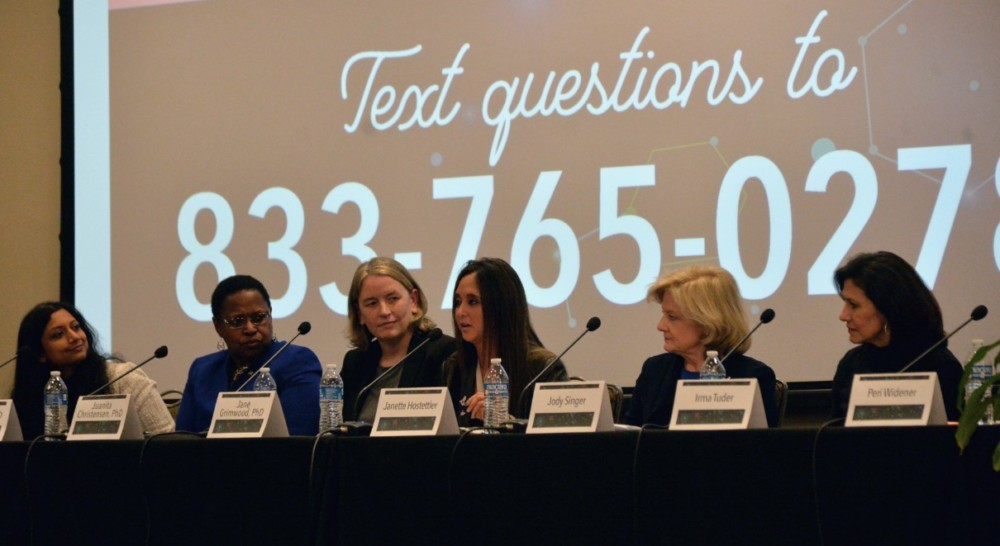By Lee Roop
al.com
WWR Article Summary (tl;dr) Several inspirational women in STEM shared their amazing journeys with girls considering careers in science, technology, engineering and mathematics.
Hunstville
Wonder about women’s scientific superpower, the “MeToo” movement and vanishing male mentors, and how to use setbacks to make comebacks.
Leading women physicians, scientists, entrepreneurs and engineers talked about all those things in Huntsville this week. They were the “Women in STEM” panel speaking at the HudsonAlpha Institute for Biotechnology to girls considering careers in science, technology, engineering and mathematics.
“Engineering wasn’t a walk in the park,” Marshall Space Flight Center Director Jody Singer said of her college years. As a young woman from the small Alabama town of Hartselle, Singer said she never thought about engineering until a mentor suggested she might like it. She didn’t know then, but she liked the idea of the paycheck.
“Look for a career that you like and that will pay,” Singer advised. Singer said her father died when she was younger, her mother struggled, and she knew she didn’t want that. “I chose a career that had interest and would pay,” she said.
“You have the biggest thoughts and the systems thinking,” Singer told the girls in the audience. “You think about things. You anticipate things. A lot of women are the best systems thinkers I’ve ever seen. Plus, you have the skills to be understanding and listening and understanding how to build a team. Building a team means you can be a great leader.”
Consulting group owner Peri Widener mentioned another mentoring opportunity for girls: Girl Scouts. “It spoke to my curiosity, exposed me to many fields, opened up what was possible for a young woman and gave me a lot of confidence,” Widener said. She said 97 percent of today’s female CEO’s have a Girl Scout background.
Panelist Juanita Christensen grew up with a father who thought women could do four things: housewife, nurse, teacher or secretary. “That’s not a criticism,” she said. “It’s just the way he was brought up.”
“Secretary didn’t sound bad,” Christensen said, and executive secretary sounded better. But her high school guidance counselor saw her ability in math and science and suggested engineering. Today, Christensen has a PhD and is director of an Army aviation and missile center in Huntsville.
Janet Hostettler overcame a work disaster and learned how to fail. She was a plant quality manager when Toyota manufacturing had its “accelerator pedal issue” a decade ago. “We actually stopped production,” she said, and the quiet in a giant plant with thousands of employees was “a little eerie, to be honest.”
During the shutdown, the company “took the time to go back to the basics,” Hostettler said, and the time to teach its employees more about their jobs, the company and its culture. “When we came back, and we did,” Hostettler said, “we came back a lot stronger than ever.”
“During that time, I learned the term ‘failing forward,” she said. “I love that. You’re able to learn from it and take risks and it’s OK to take risks. You might fail, but at least you’re going to fail forward and learn from it.”
Hostettler is now vice president of production for the new Mazda-Toyota plant under construction in Huntsville.
Sticking with it, whatever “it” is for you, was a panel theme. “The main thing to keep in mind is if you have a goal and you fall short of that, there’s always a way to get back around,” Dr. Aruna Arora said. “Don’t give up.”
Arora’s story starts with her failure to get into the university she wanted. The one she did attend, Washington University in St. Louis, turned out so rigorous that Arora said she had no problem keeping a 4.0 average in graduate school.
Medicine is a beautiful combination of scientific curiosity and a desire to connect to people, Arora said. “It’s very fascinating,” she said. “It falls within very hard core science all the way to being an art.”
HudsonAlpha genetic researcher Jane Grimwood has a Phd and three postdoc tenures at Oxford, Dartmouth and the University of California in San Francisco, where she was hired by HudsonAlpha President and Science Director Rick Myers.
“I remember waking up that first night in Boston (for the Dartmouth postdoc) thinking, ‘What have I done?’” Grimwood said. “I didn’t know anybody. Sometimes, you just have to take the plunge, and that’s what worked out.”
“When I started in life sciences, computers just wasn’t a thing,” Grimwood said. “Now, it’s not OK to work as a scientist and not have experience with computers. All the work we do is with huge data sets. You need to be comfortable with that. You need to start early, be comfortable with computers, do everything you can do to understand computers.”
Irma Tuder, founder and CEO of an analytical services company, had a cautionary tale and advice for her young audience.
“Recently I had an incident that was like a slap in the face to me,” Tuder said. “I had a young woman ask me how she could go about finding a mentor. She told me she had had a conversation with her boss, who happened to be male, who basically told her that men can’t really be mentoring females or be around them anymore because of the ‘Me,too’ movement.’”
Men are not inviting women to the happy hours and social events where business and career opportunities are found, Tuder said, “so she told me she was really struggling.”
Thinking of her own male mentors and how much they helped her, Tuder said women “need to support each other now, because we really can help each other to elevate our careers and professions and whatever we’re trying to pursue.”
___
Distributed by Tribune Content Agency, LLC














































































































































































































































































































































































